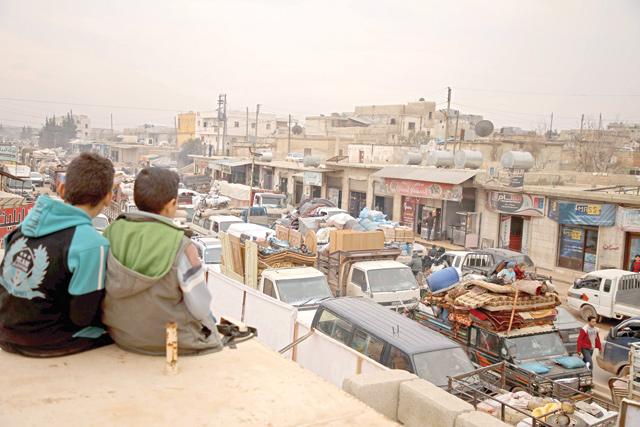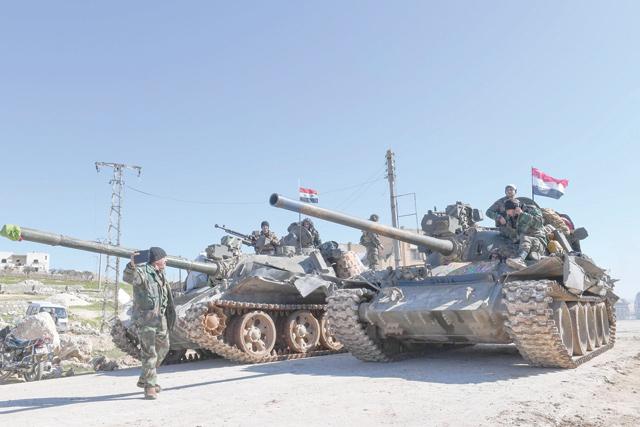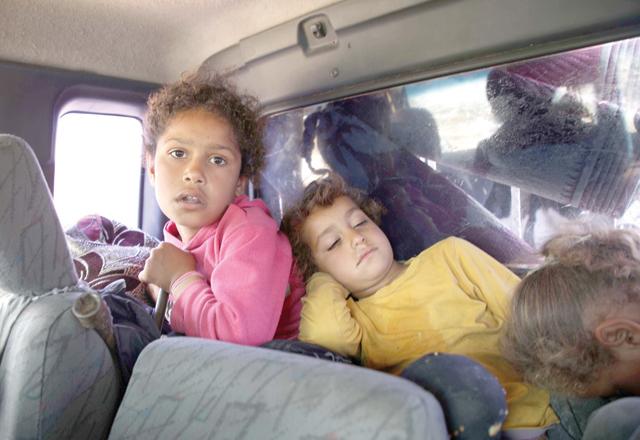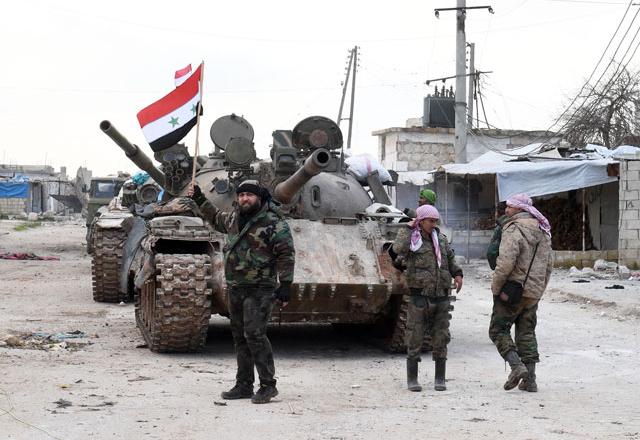You are here
'Syria violence displaces 500,000 in two months'
By AFP - Feb 04,2020 - Last updated at Feb 04,2020

Syrian boys sitting on a ledge watch traffic in the town of Hazano in the northern countryside of Idlib, on Tuesday, as people flee northwards in vehicles transporting their belongings, amid an ongoing violence (AFP photo)
HAZANO, Syria — Weeks of violence in Syria's last rebel enclave has caused one of the biggest waves of displacement in the nine-year-old unrest.
The Syrain army's ground offensive against extremists in northwest Idlib has emptied entire towns and sent huge numbers fleeing north towards the Turkish border.
"Since December 1, some 520,000 people have been displaced from their homes, the vast majority — 80 per cent — of them women and children," said David Swanson, spokesman for the UN Office for the Coordination of Humanitarian Affairs (OCHA).
The exodus, which coincides with a biting winter, is one of the largest since the 2011 start of a conflict in which more than half of the country's pre-war population of 20 million has been displaced.
“This latest displacement compounds an already dire humanitarian situation on the ground, when over 400,000 people were displaced from the end of April through the end of August, many of them multiple times,” Swanson said.
He said the UN was alarmed by the plight of more than three million people — half of them displaced from their homes — who live in Idlib province and surrounding areas.
The Syrian army has in recent weeks upped the pressure on the Idlib region.
The army has retaken dozens of villages and some major towns — including the former rebel bastion of Maaret Al Numan — and continue to advance, pushing displaced populations ever closer to the Turkish border.
On Tuesday, Turkey’s President Recep Tayyip Erdogan said Ankara would not allow Syrian forces to gain further ground, a day after tensions escalated between Turkish and Syrian forces.
“Syria is right now trying to buy time by driving those innocent and grieving people in Idlib toward our borders,” Erdogan said.
“We will not allow Syria the opportunity to gain ground there.”
Turkey, which already hosts more than three million Syrian refugees, is keen to stop another mass influx.
In the town of Hazano, an AFP correspondent saw dozens of small trucks, vans and tuk-tuks piled high with belongings crawl along a main road.
They advanced bumper-to-bumper, carrying men, women and children — but also blankets, carpets, washing basins, chairs, cupboards and doors.
Mohammad Bahjat, 34, said he and his family were escaping deadly bombardment for the third time in days.
“We fled in the middle of the night, and have no idea where to go,” he told AFP, sitting in the front of a pickup truck next to his wife and three small boys.
“You never know when a rocket or shell is going to hit.”
Almost 300 civilians have been killed since mid-December in the violence in the Idlib region, the Britain-based Syrian Observatory for Human Rights says.
Syrian forces are attacking the enclave on two fronts, from the south of the province where they have already reconquered much ground, and from the province of Aleppo to the west.
Jennifer Fenton, a spokeswoman for the UN Special Envoy for Syria Geir Pedersen, said the consequences of the latest escalation were “devastating”.
“The price that the civilian population is paying is too high,” she said.
Another OCHA spokesman, Jens Laerke, said: “Many of the displaced have left with nothing but the clothes on their back or what they could pile onto ramshackle vehicles.”
He continued: “They urgently need shelter, food, water and sanitation support, health support, emergency education and not least protection.”
The World Health Organisation has warned that conditions in the violence-wracked region are conducive to the outbreak of diseases.
On Monday, the Turkish and Syrian armies engaged in their deadliest clashes since Ankara sent troops to Syria in 2016.
The Syrian army shelling of Turkish positions in Idlib killed at least five Turkish soldiers and three civilians, Ankara said.
Retaliatory fire from Turkey killed at least 13 Syrian government troops, the observatory said, in an incident that further tested the uneasy coordination between Russia and Turkey — the two main foreign brokers in the Syrian conflict.
Under an agreement reached in Sochi last year, Russia was meant to prevent Damascus from launching a devastating operation in the densely populated Idlib enclave.
Turkey’s part of the deal was to contain the extremist groups running the region, but instead the forces it supports have been sidelined by Syria’s former Al Qaeda affiliate.
Related Articles
QAMINAS, Syria — Syrian army artillery killed five Turkish soldiers in Idlib Monday, Turkey's defence ministry said, as the number of people
BEIRUT — Fighting in northwestern Syria has displaced nearly 140,000 people since February, the UN said on Wednesday, as the regime and its
QAMINAS, Syria — Tensions escalated on Tuesday between the Syrian army and Turkey as a Syrian military helicopter was shot down and Ankara w














